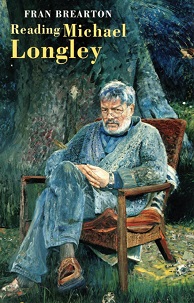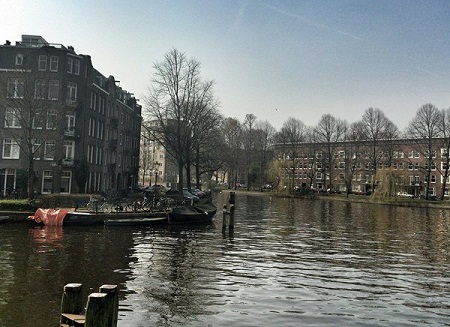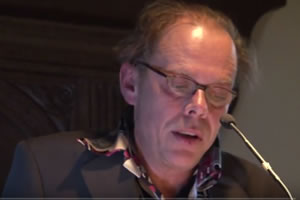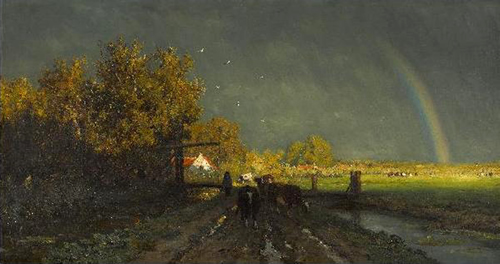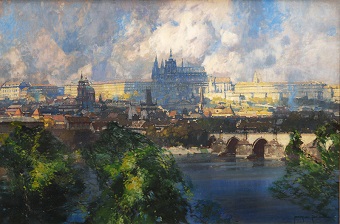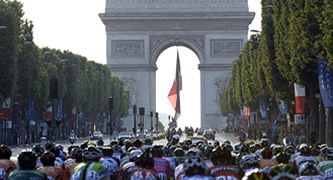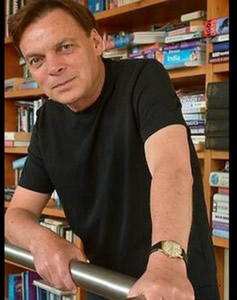Dolce far niente
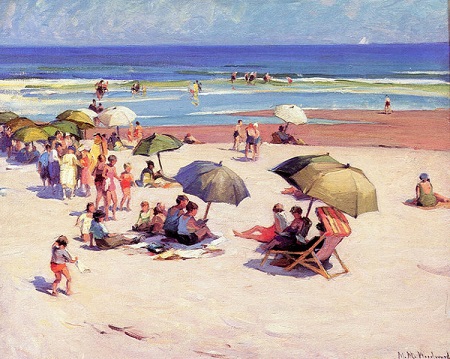
Bathers On A Beach door Mabel May Woodward, ca. 1915–1920
Summer at the Beach
Before we started camp, we went to the beach.
Long days, before the sun was dangerous.
My sister lay on her stomach, reading mysteries.
I sat in the sand, watching the water.
You could use the sand to cover
parts of your body that you didn’t like,
I covered my feet, to make my legs longer;
the sand climbed over my ankles.
I looked down at my body, away from the water.
I was what the magazines told me to be:
coltish. I was a frozen colt.
My sister didn’t bother with these adjustments.
When I told her to cover her feet, she tried a few times,
but she got bored; she didn’t have enough willpower
to sustain a deception.
I watched the sea; I listened to other families.
Babies everywhere: what went on in their heads?
I couldn’t imagine myself as a baby;
I couldn’t picture myself not thinking.
I couldn’t imagine myself as an adult either.
They all had terrible bodies: lax, oily, completely
committed to being male and female.
The days were all the same.
When it rained, we stayed home.
When the sun shone, we went to the beach with my mother.
My sister lay on her stomach, reading her mysteries.
I sat with my legs arranged to resemble
what I saw in my head, what I believed was my true self.
Because it was true: when I didn’t move I was perfect.

Louise Glück (New York, 22 april 1943)
Zomer in New York
De Ierse dichter Michael Longley werd geboren op 27 juli 1939 in Belfast. Zie ook alle tags voor Michael Longley op dit blog.
The Waterfall
If you were to read my poems, all of them, I mean,
My life’s work, at the one sitting, in the one place,
Let it be here by this half-hearted waterfall
That allows each pebbly basin its separate say,
Damp stones and syllables, then, as it grows dark
And you go home past overgrown vineyards and
Chestnut trees, suppliers once of crossbeams, moon-
Shaped nuts, flour, and crackly stuffing for mattresses,
Leave them here, on the page, in your mind’s eye, lit
Like the fireflies at the waterfall, a wall of stars.
Freeze-Up
The freeze-up annexes the sea even,
Putting out over the waves its platform.
Let skies fall, the fox’s belly cave in –
This catastrophic shortlived reform
Directs to our homes the birds of heaven.
They come on farfetched winds to keep us warm.
Romantic
Bribing these with bounty, we would rather
Forget our hopes of thaw when spring will clean
The boughs, dust from our sills snow and feather,
Release to its decay and true decline
The bittern whom this different weather
Cupboarded in ice like a specimen
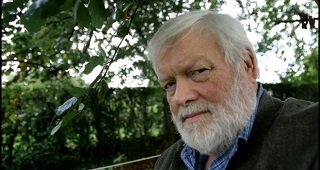
Michael Longley (Belfast, 27 juli 1939)
De Nederlandse schrijfster en psychologe Marijke Höweler werd geboren in Koog aan de Zaan op 27 juli 1938. Zie ook alle tags voor Marijke Höweler op dit blog.
Uit: Zum Wohl, Zum Glück!
“Bovengekomen met de stapel houtblokken waarvoor hij eigenlijk naar beneden was gegaan bleef hij een ogenblik uit het raam staan kijken. Als een verre, vage schemerlamp bescheen de zon het mistige dal. Het was zes uur. Jasper kon zich niet herinneren de laatste jaren ooit zo vroeg te zijn opgestaan. Toch leek hij in het verleden goede ervaringen te hebben opgedaan met dit vroege uur want er maakte zich een gevoel van hem meester alsof hij een onvervreemdbaar deel van de schepping uitmaakte. Dit vervulde hem van hoopvolle verwachting en een soort energie die hij zich ook herinnerde als behorend tot vervlogen dagen. Buiten maakten de vogels – de soort kende hij niet – geluiden alsof ze met een handzaag op een roestige spijker gestuit waren, terwijl de koeien een houten tafel over een stenen vloer leken te schuiven. Ook in de dierenwereld is het niet altijd rozegeur en maneschijn blijkbaar. Gisteren was Jasper zo kinderachtig geweest om direct na aankomst in zijn betrekkelijk nieuwe huis het zwaluwnest onder de dakrand te verwijderen. Met toegeknepen ogen en afgewend gezicht van schaamte had hij hun eengezinswoning met een forse duw van de bezem van zijn fundamenten gestoten. Jasper had zich daarbij de krakersbeweging voor ogen gehouden; en het feit dat de diertjes er de voorkeur aan gegeven hadden buiten het eigen nest, maar langs Jaspers glanzende beits te toiletteren en dus eigenlijk in Jaspers nest, had hem daar bij geholpen.
Wat zou hij nu eens gaan doen behalve wachten tot de bakker langs kwam? Witkalk gaan kopen misschien om z’n zonde ongedaan te maken? Maar Jasper vond dat sneu voor de bakker, die te zamen met zijn treurige dochter dag in dag uit deze negorij bezocht in de hoop dat één van de bewoners uit het rijtje van sterkste schouders die meenden de zwaarste lasten te dragen door de liquide middelen persoonlijk over de grens te tillen, hier zou zijn vandaag. Een kleine impasse dus en Jasper drentelde de voordeur uit en maakte een rondje om zijn huis. De zon had nu de mist uit het dal verdreven en veegde de laatste restjes tussen de bomen weg. Kringelend kwamen zij in de vorm van rookwolkjes uit hun schuilplaatsen te voorschijn. Jasper zou graag de krant zijn gaan lezen op zijn stoepje in de zon. Maar er was geen krant. Ook zou hij graag een praatje gemaakt hebben met een onbekend iemand. Maar er was niemand. Nee, zijn nieuwe huisje voldeed aan al z’n verwachtingen: de koeien, het gras, de beek, de bomen, de zenuwachtige vogeltjes en hij. En daar was de bakker, nee niet de bakker… of toch? Jawel daar was de bakker.”
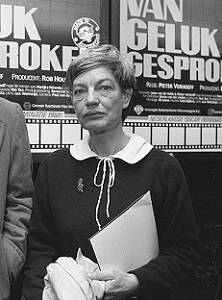
Marijke Höweler (27 juli 1938 – 5 mei 2006)
In 1987
De Amerikaanse schrijfster en literatuurcritica Elizabeth Hardwick werd geboren op 27 juli 1916 in Lexington, Kentucky. Zie ook alle tags voor Elizabeth Hardwick op dit blog.
Uit: Sleepless Nights
“It is june. This is what I have decided to do with my life just now. I will do this work of transformed and even distorted memory and lead this life, the one I am leading today. Every morning the blue clock and the crocheted bedspread with its pink and blue and gray squares and diamonds. How nice it is—this production of a broken old woman in a squalid nursing home. The niceness and the squalor and sorrow in an apathetic battle—that is what I see. More beautiful is the table with the telephone, the books and magazines, the Times at the door, the birdsong of rough, grinding trucks in the street.
If only one knew what to remember or pretend to remember. Make a decision and what you want from the lost things will present itself. You can take it down like a can from a shelf. Perhaps. One can would be marked Rand Avenue in Kentucky and some would recall the address at least as true. Inside the can are the blackening porches of winter, the gas grates, the swarm.
The sunlight blinds me. When I look up I see confusing electricity behind windows. Maybe the shadows will suffice, the light and the shade. Think of yourself as if you were in Apollinaire’s poem:
Here you are in Marseilles, surrounded by watermelons.
Here you are in Coblenz at the Hotel du Geant.
Here you are in Rome sitting under a Japanese medlar tree.
Here you are in Amsterdam…
1954
Dearest M.: Here I am in Boston, on Marlborough Street, number 239. I am looking out on a snowstorm. It fell like a great armistice, bringing all simple struggles to an end. In the extraordinary snow, people are walking about in wonderful costumes—old coats with fur collars, woolen caps, scarves, boots, leather hiking shoes that shine like copper. Under the yellow glow of the streetlights you begin to imagine what it was like forty or fifty years ago. The stillness, the open whiteness—nostalgia and romance in the clear, quiet, white air… More or less settled in this handsome house. Flowered curtains made to measure, rugs cut for the stairs, bookshelves, wood for the fireplace.“
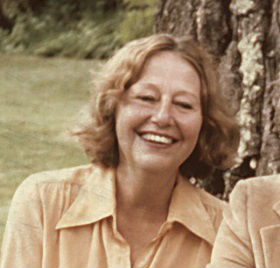
Elizabeth Hardwick (27 juli 1916 – 2 december 2007)
De Roemeense dichter en schrijver Dan Coman werd geboren op 27 juli 1975 in Gersa in de provincie Bistrita-Nasaud. Zie ook alle tags voor Dan Coman op dit blog.
Chicco
i wake up every morning before five
and like this, unwashed without tobacco
like this, in the dark and cold
i get out of bed on all fours
feeling for it.
before five he’s no more than a glass bead
when I touch him whoosh
leaping to some other part of the room.
i pick him up quickly, using only two fingers
roll him only on the carpet
lest he make noise and
wake the girls.
so it’s this way at five on all fours with this sun
this sun in the room rolled for hours on end
until like a snowball it grows quite large
until it begins to brighten begins to warm
though it’s only after growing so large
brighter and warmer
it’s only then that the sweat pours out
the chicco sun sweating likes a grown man
and at eight when the girls wake up
they must open the window
needing nearly an hour to air out the room.
Impossible to move
i’m impossible to move, there is nothing inside me
still I’m impossible to move with the force of only one man.
like a massive piece of living-room furniture.
like anything that means nothing in itself.
but i talk. i talk until the skin of my cheeks bursts.
i never stop talking.
all my force gathers like a spring inside my mouth
and mercilessly beats out sound after sound. phrase after phrase.
nobody ever seems to get tired of understanding nothing of what I say.
nobody seems annoyed because there’s nobody left.
that’s how I was born. straight out of the ground impossible to move
directly with words outside mine. exactly like this.
like anything else that means nothing in itself.
Vertaald door Martin Woodside en Ioana Ieronim
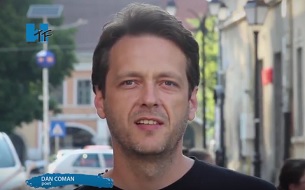
Dan Coman (Gersa, 27 juli 1975)
De Duitse schrijfster, dichteres en vertaalster Hilde Domin werd geboren in Keulen als Hilde Löwenstein op 27 juli 1909. Zie ook alle tags voor Hilde Domin op dit blog.
Älter werden
Antwort an Christa Wolf
Die Sehnsucht
nach Gerechtigkeit
nimmt nicht ab
Aber die Hoffnung
Die Sehnsucht
nach Frieden
nicht
Aber die Hoffnung
Die Sehnsucht nach Sonne
nicht
täglich kann das Licht kommen
durchkommen
Das Licht ist immer da
eine Flugzeugfahrt reicht
zur Gewissheit
Aber die Liebe
der Tode und Auferstehungen fähig
wie wir selbst
und wie wir
der Schonung bedürftig
Herbstaugen
Presse dich eng
an den Boden.
Die Erde
riecht noch nach Sommer,
und der Körper
riecht noch nach Liebe.
Aber das Gras
ist schon gelb über dir.
Der Wind ist kalt
und voll Distelsamen.
Und der Traum, der dir nachstellt,
schattenfüssig,
dein Traum
hat Herbstaugen.
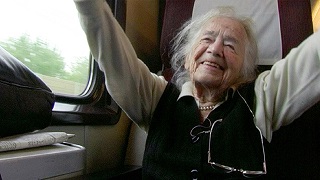
Hilde Domin (27 juli 1909 – 22 februari 2006)
Onafhankelijk van geboortedata
De Iers-Britse schrijfster Eimear McBride werd geboren in 1976 in Liverpool en groeide op in Tubbercurry, County Sligo en in Castlebar, County Mayo. Zie ook alle tags voor Eimear McBride op dit blog.
Uit: A Girl is a Half-Formed Thing
“For you. You’ll soon. You’ll give her name. In the stitches of her skin she’ll wear your say. Mammy me? Yes you. Bounce the bed, I’d say. I’d say that’s what you did. Then lay you down. They cut you round. Wait and hour and day.
Walking up corridors up the stairs. Are you alright? Will you sit, he says. No. I want she says. I want to see my son. Smell from dettol through her skin. Mops diamond floor tiles all as strong. All the burn your eyes out if you had some. Her heart going pat. Going dum dum dum. Don’t mind me she’s going to your room. See the. Jesus. What have they done? Jesus. Bile for. Tidals burn. Ssssh. All over. Mother. She cries. Oh no. Oh no no no.
I know. The thing wrong. It’s a. It is called. Nosebleeds, head aches. Where you can’t hold. Fall mugs and dinner plates she says clear up. Ah young he says give the child a break. Fall off swings. Can’t or. Grip well. Slipping in the muck. Bang your. Poor head wrapped up white and the blood come through. She feel the sick of that. Little boy head. Shush.
She saw it first when you couldn’t open your eye. Don’t wink so long wind’ll change and you’ll stay that way. I’m not Mammy. It’s got stuck. She pull it open. Hold it up. I can’t it’s all fall down.
And now Holy Family on a Saturday night. He is leaning you are sleeping she the chair me whirlabout. Listen in to doctor chat. We done the best we could. There really wasn’t much. It’s all through his brain like the roots of trees. Sorry. Don’t say. That. He’s running out I’m afraid. I’m afraid he’s running down. You should take him home, enjoy him while you can. He’s not. He is. Can’t you operate again? We can’t. Shush. Something? Chemo then. We’ll have a go at that.
Gethsemane dear Lord hear our prayer our. Please. Intercession. Night in hospital beds. Faces on the candlewick. Lino in the knees. Please don’t God take. Our. Holy Mary mother of all, humbly we beseech thee.”
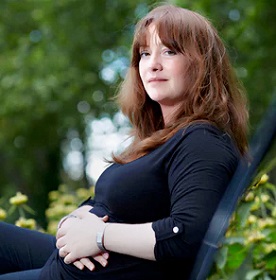
Eimear McBride (Liverpool, 1976)
De Nieuw-Zeelandse schrijver Graeme C. Simsion werd geboren in in Auckland, Australië, in 1956. Zie ook alle tags voor Graeme C. Simsion op dit blog.
Uit: The Rosie Project
“Afterward, Claudia advised me that I should have abandoned the experiment prior to Elizabeth’s leaving. Obviously. But at what point? Where was the signal? These are the subtleties I fail to see. But I also fail to see why heightened sensitivity to obscure cues about ice-cream flavors should be a prerequisite for being someone’s partner. It seems reasonable to assume that some women do not require this. Unfortunately, the process of finding them is impossibly inefficient. The Apricot Ice Cream Disaster had cost a whole evening of my life, compensated for only by the information about simulation algorithms. • • • Two lunchtimes were sufficient to research and prepare my lecture on Asperger’s syndrome, without sacrificing nourishment, thanks to the provision of Wi-Fi in the medical library café. I had no previous knowledge of autism spectrum disorders, as they were outside my specialty. The subject was fascinating. It seemed appropriate to focus on the genetic aspects of the syndrome, which might be unfamiliar to my audience. Most diseases have some basis in our DNA, though in many cases we have yet to discover it. My own work focuses on genetic predisposition to cirrhosis of the liver. Much of my working time is devoted to getting mice drunk. Naturally, the books and research papers described the symptoms of Asperger’s syndrome, and I formed a provisional conclusion that most of these were simply variations in human brain function that had been inappropriately medicalized because they did not fit social norms–constructed social norms–that reflected the most common human configurations rather than the full range. The lecture was scheduled for 7:00 p.m. at an inner-suburban school. I estimated the cycle ride at twelve minutes and allowed three minutes to boot my computer and connect it to the projector. I arrived on schedule at 6:57 p.m., having let Eva, the short-skirted cleaner, into my apartment twenty-seven minutes earlier. There were approximately twenty-five people milling around the door and the front of the classroom, but I immediately recognized Julie, the convenor, from Gene’s description: “blonde with big tits.” In fact, her breasts were probably no more than one and a half standard deviations from the mean size for her body weight and hardly a remarkable identifying feature.”
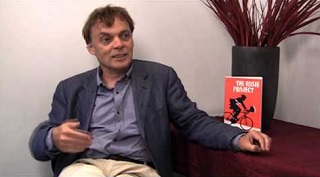
Graeme C. Simsion (Auckland in 1956)
Zie voor nog meer schrijvers van de 27e juli ook mijn blog van 27 juli 2017 en ook mijn blog van 27 juli 2011 deel 2

